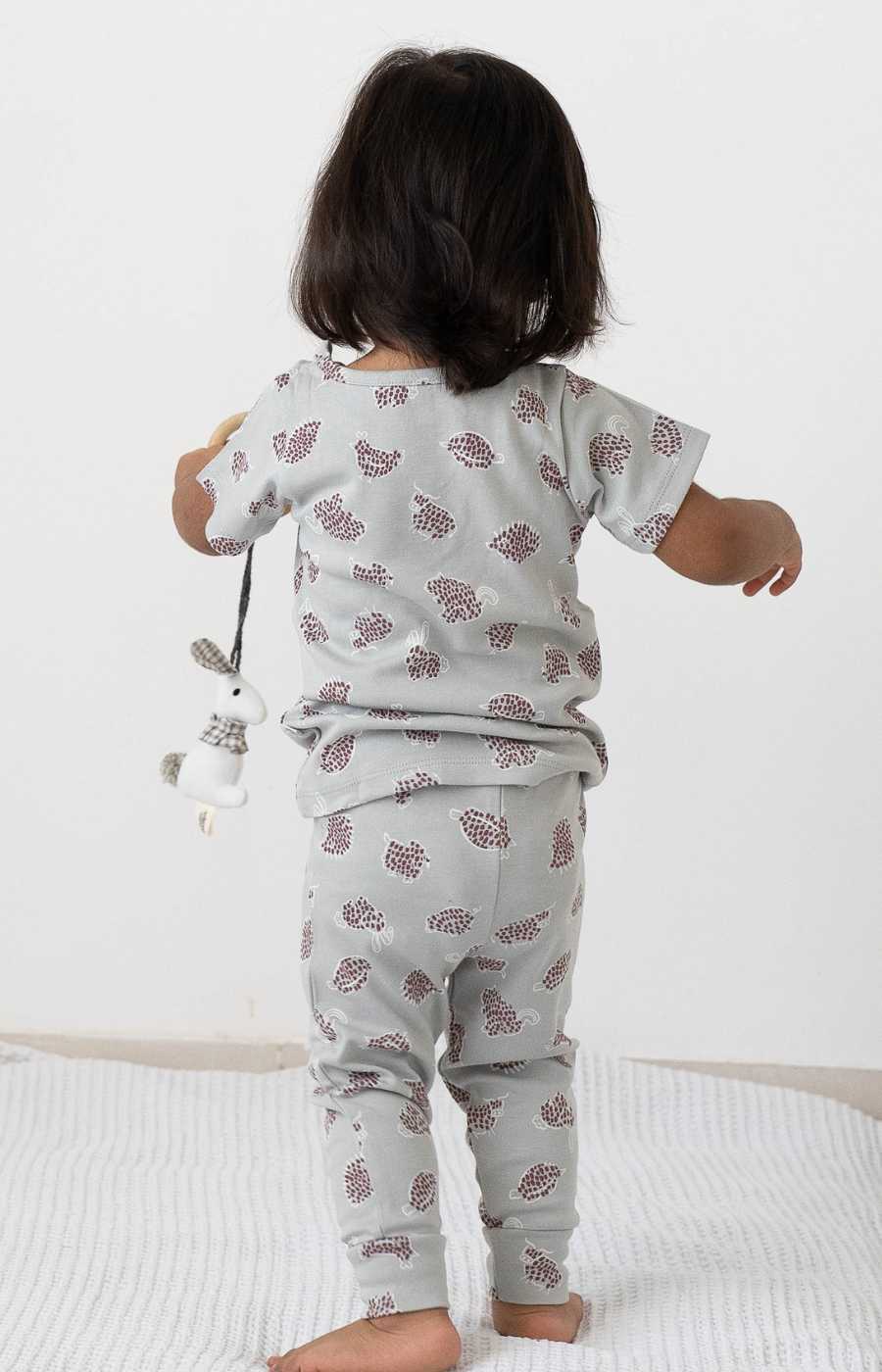Key Takeaways
-
A consistent baby nap schedule by age helps meet changing sleep needs from newborns to toddlers.
-
Frequent disruptions or short naps baby often signal a need to adjust your infant's nap schedule or sleep environment.
-
If your baby wakes up crying from naps, it may be due to incomplete cycles, discomfort, or sleep regression.
-
Wondering should I wake the baby from a long nap? Yes, if naps are too long, it may affect nighttime sleep.
-
If you’ve tried a healthy nap routine for infants and the baby won’t nap, it may be time to seek professional help.
In This Blog
- Key Takeaways
- In This Blog
- Introduction
- Baby Nap Time Meaning
- Why Are Naps So Important for Babies?
- Nap time is your baby’s daytime reset. But more than just rest, it's vital for
- Baby Nap Length Guidelines by Age (Newborn To 2 Years)
- Signs That Your Baby’s Naps Aren’t Working
- How To Get Baby To Nap: Tips for Supporting Healthy Nap Habits
- To get your baby to nap, check out these helpful tips
- How To Extend Baby Naps
- Why Do Babies Wake Up Crying From Naps
- When To Seek Professional Help
- Frequently Asked Questions on Baby Nap
Introduction
Your baby naps for twenty minutes and wakes up grumpy just when you're finally getting into a rhythm. Is that typical?
Both your sanity and your baby's growth depend on your ability to understand how much sleep does a newborn need. Nap requirements change rapidly from infancy to toddlerhood, and skipping naps can result in sleepless nights, grumpy wake-ups, and exhausted evenings.
This article will explain the nap routine for newborn, is it normal for newborns to nap all day, how long should infant naps be and how to create a healthy sleep schedule that works for both babies and toddlers.
Baby Nap Time Meaning
Naptime is the time of day during which a person, especially a child, takes a nap. [1] Babies take naps at least twice a day, once in the morning and once in the early afternoon, after the newborn period. A late-afternoon snooze is also necessary for certain newborns. Consider scheduling naps at 9 a.m. and 1 p.m. Unless they have problems falling asleep at night, let newborns snooze for as long as they like.
Why Are Naps So Important for Babies?
Nap time is your baby’s daytime reset. But more than just rest, it's vital for:
-
Brain development and memory consolidation:
Your baby's brain processes and retains new information while they sleep, which aids in their retention of the knowledge they have gained during play, interaction, and learning.
-
Emotional regulation:
Frequent naps improve a baby's ability to control their emotions, minimising irritability, tantrums, and overstimulation during the day.
-
Physical growth and immune support:
In addition to promoting healthy development and a robust immune system, naps help the body repair and strengthen itself by stimulating the production of growth hormones.
[2] Although daytime naps help avoid overtiredness, they paradoxically lead to worse nighttime sleep if taken too late or too long.

Baby Nap Length Guidelines by Age (Newborn To 2 Years)
To better understand your baby’s sleep needs and set realistic expectations, here’s a baby nap duration chart by age from newborn to 2 years.
|
Age |
Number of Naps |
Nap Duration (each) |
Total Nap Time |
|
0–3 months |
4–5 |
30–90 mins |
4–6 hrs |
|
4–6 months |
3 |
1–2 hrs |
3–5 hrs |
|
7–12 months |
2 |
1–2 hrs |
2.5–4 hrs |
|
1–2 years |
1–2 |
1–2 hrs |
2–3 hrs |
Signs That Your Baby’s Naps Aren’t Working
A proper nap schedule is vital for a baby's development. Neither under-napping nor over-napping is considered good. Here are some signs to look out for:
Signs of Under-napping:
Watch out for these signs of under-napping:
-
Cranky and fussy after waking:
If your baby is waking up cranky and tired, even after waking up, it might be a sign that they are not getting enough sleep.
-
Frequent night wakings:
If your baby wakes up frequently during the night, this might be a sign of discomfort, indicating a lack of proper sleep. Also check out our guide on how to make baby sleep longer at night.
-
Rubbing eyes and yawning before nap time:
If he starts to yawn and rub his eyes, it might be a sign of overtiredness, indicating that the nap may not be long enough.
Signs of Over-napping:
Find your baby napping more than usual? Look out for these signs:
-
Refusal to go to bed at night:
If you have to invest a lot of time and energy to persuade your baby to go to bed at night, it might be that he is having longer naps during the day.
-
Early morning wake-ups:
If the baby wakes up at early dawn, it means his sleep needs are being met too early.
-
Sleeping too long during the day:
Extended naps, such as more than 3 hours in one stretch, can throw off your baby’s natural sleep-wake rhythm, affecting both quality and consistency of overnight sleep.

How To Get Baby To Nap: Tips for Supporting Healthy Nap Habits
To get your baby to nap, check out these helpful tips
-
Follow age-appropriate wake windows to avoid overtiredness:
Keep note of how long your baby is awake between naps to determine age-appropriate wake windows. Put them to bed before they exhibit symptoms of overtiredness to help them fall asleep more quickly and stay asleep longer.
-
Choose Baby Sleep Clothes Wisely:
To keep your infant comfortable, use organic baby clothes like baby nightsuits, which are made of breathable, soft materials, to help the baby sleep comfortably
-
Use consistent nap routines:
A song, a story, or calm sleeping time can help your baby wind down and learn when it's time to go to sleep.
-
Keep the environment nap-friendly:
By dimming the lights, using white noise, removing toys or distractions from the sleep space and placing your baby in a baby swaddle or a baby sleeping bag, you can create an ideal environment for his sleep.
-
Allow some self-soothing time if the baby wakes mid-nap:
Give your baby a few minutes to go back asleep on their own before intervening if they wake up in the middle of their nap.
How To Extend Baby Naps
To prevent overtiredness, start by making sure your baby is falling asleep at the appropriate time. Pay close attention to their wake-up time and monitor it, and make sure the sleep environment is cool, quiet, and dark, and maintain a regular and soothing nap schedule. Lastly, wait a few minutes before stepping in to help your baby self-soothe if they wake up too early.
Why Do Babies Wake Up Crying From Naps
Babies often cry out when they wake up from naps for a variety of reasons, such as pain, overtiredness, or interrupted sleep cycles. Naps can also be disturbed by hunger, a wet diaper, teething, or extremes of temperature. Moreover, separation anxiety may cause difficulty upon waking up around 6 to 9 months.

When To Seek Professional Help
If your baby starts napping less and less than their usual routine or seems unusually fussy and overtired despite a solid sleep routine, it's a good idea to talk to your pediatrician. There may be underlying issues worth exploring.
Frequently Asked Questions on Baby Nap
1. Is it okay if my baby only naps for 30 minutes?
If your newborn only naps for 30 minutes, that’s a short nap. Short naps are normal and developmentally appropriate in those first several months. Please don't let those short naps steal your joy.
2. What’s the ideal nap schedule?
The ideal nap schedule depends on age. Newborns nap frequently and irregularly, while by 4–6 months, babies typically take 3 naps a day. Naps shift to one solid afternoon nap in case of a 15-month-old sleep schedule.
3. Should I wake my baby if they nap too long?
Yes, especially if a long nap interferes with bedtime or overnight sleep. Gently waking them helps maintain a balanced sleep schedule and keeps nighttime rest on track.
4. My baby does not take an afternoon nap. Should I worry?
Not always. Some babies skip naps during transitions. Keep offering quiet time and stay consistent because many babies adjust with time.
5. When do kids stop napping?
Most children stop napping between the ages of 3 and 5.
Citations
[1] https://www.mayoclinic.org › baby-naps › art-20047421
[2] https://www.sleepfoundation.org/how-sleep-works/does-napping-impact-sleep-at-night
Related blogs
With Love, from Cocoon Care
Dear Parent,
No matter where you are, your baby deserves gentle beginnings and comforting care. At Cocooncare, we pour love into every stitch. From soft muslin baby swaddles to cozy sleep pods and thoughtfully made newborn clothing, our essentials hold your baby with the same tenderness as you do. You can find baby essentials on our website and also on Amazon, Firstcry, Myntra, Nykaafashion and DuckDuck baby.
Because every baby deserves to be cocooned in care.
About the Author: The Cocoon Care Editorial Team works with pediatric consultants and experienced parents to bring you baby care tips you can trust.
Popular Searches
Bottom wear | Baby Clothes Online | Baby Romper | Baby Gift Set | Sleep Essentials | Burp cloths | Baby Bibs Online | Nappy For Baby | Hooded Baby Towel | Baby Mittens | Baby Sleep Sack | Cloth Nappy















